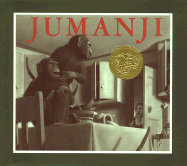Jumanji

 |
 |
 |
|---|---|---|
     |
Sensitivity |      |
     |
Judgment |      |
     |
Focus |      |
     |
Action |      |
by Chris Van Allsburg
Jumanji is about prudence, a series of events, and imagination. The genre of the story is Comedy and Action/Adventure, the setting is Contemporary and Fantasy, and the heritage is North American.
When two young children begin a game of Jumanji, they know that they'll have to finish, but they don't expect the arrival of real-life jungle animals in their house. They rush through a flood, a volcanic eruption, stampedes, and attacking lions to the end of the game, and their parents' arrival home.
Moral reasoning in the story focuses on self concern and concern for law and order.
The theme of the story is Always read the instructions and listen to directions.
 |
Violence Violence in the story is not graphic, and rewarded never. Harm to other living things is unacceptable and focuses on . |
 |
Cruelty |
 |
Rudeness |
 |
Religion/Spirituality |
 |
Stereotypes |
Key Virtues
- Cooperation
- Courage
- Obedience
- Self discipline
- Trustworthiness
- Duty
- Hard work
- Moderation/Temperance
- Planfulness
- Prudence
Key Vices
- Disobedience
- Impulsiveness
- Intemperance
- Untrustworthy
- Foolishness
- Laziness/Sloth
- Reckless
- Thoughtless
- Undisciplined
- Unreflective/Don't think of consequences of actions
The 4 Component Model
- Ethical Sensitivity - Evidence of concern for others and awareness of the consequences of one's actions.
- Ethical Judgment - Shows characters deliberating about ethical choices.
- Ethical Focus - Addresses the ethical demand in the situation, prioritizing moral goals and responsibilities over selfish interests.
- Ethical Action - Has a character who takes several steps to reach a moral goal and perseveres to complete the ethical action.